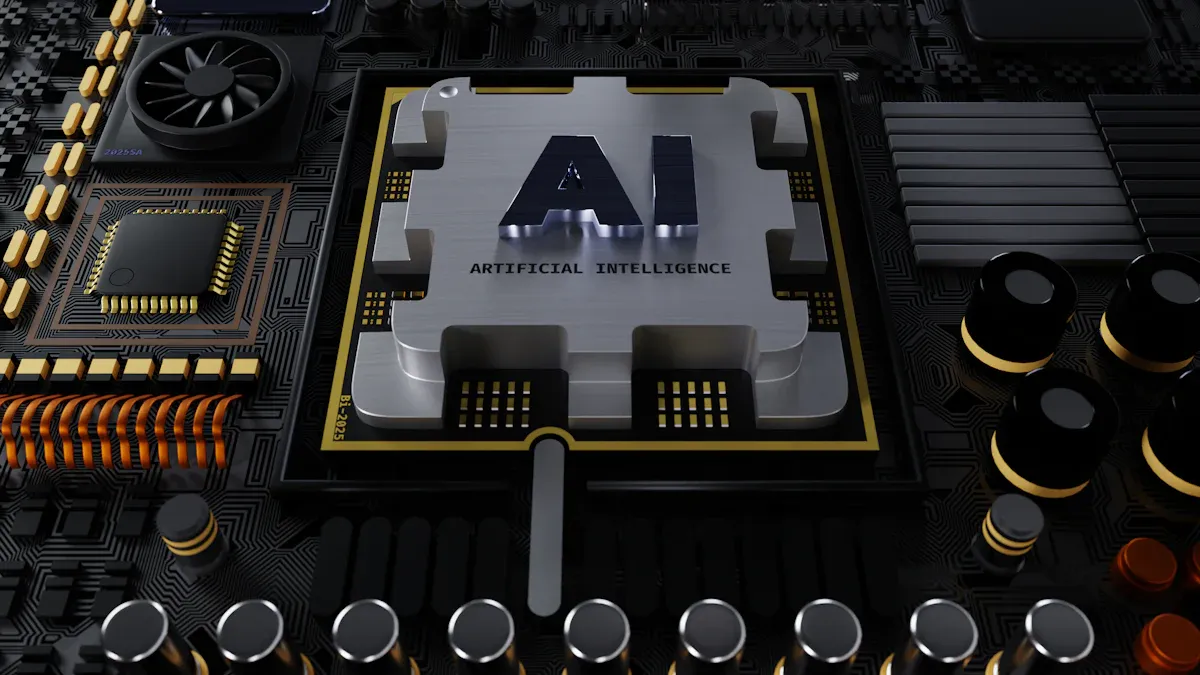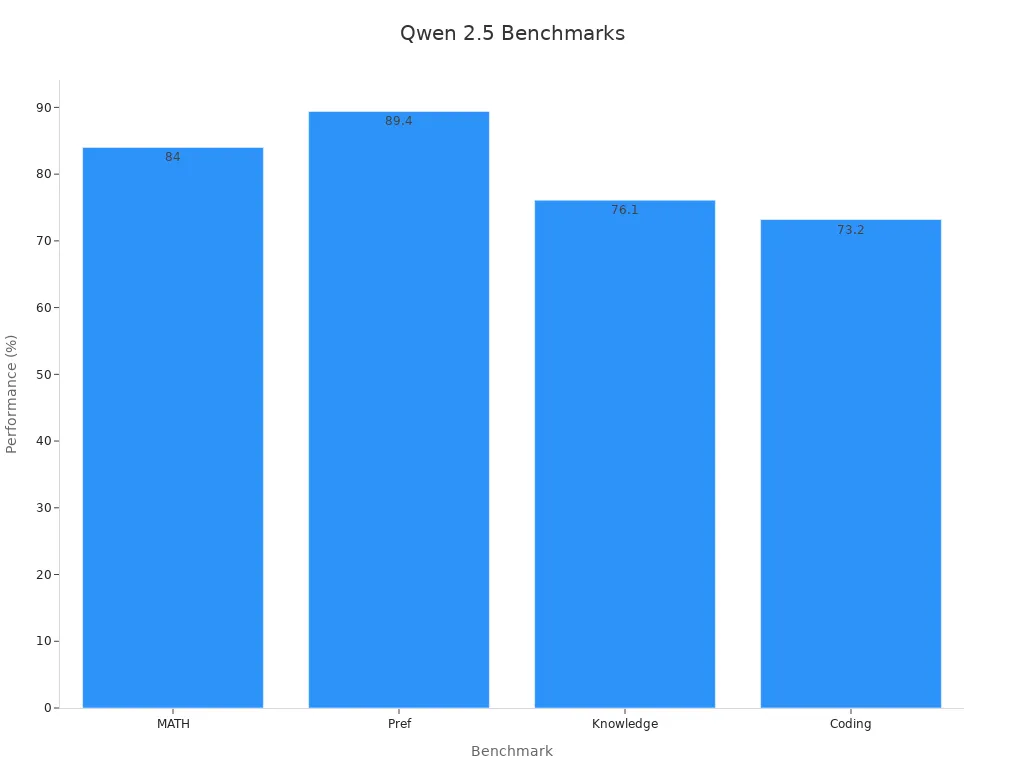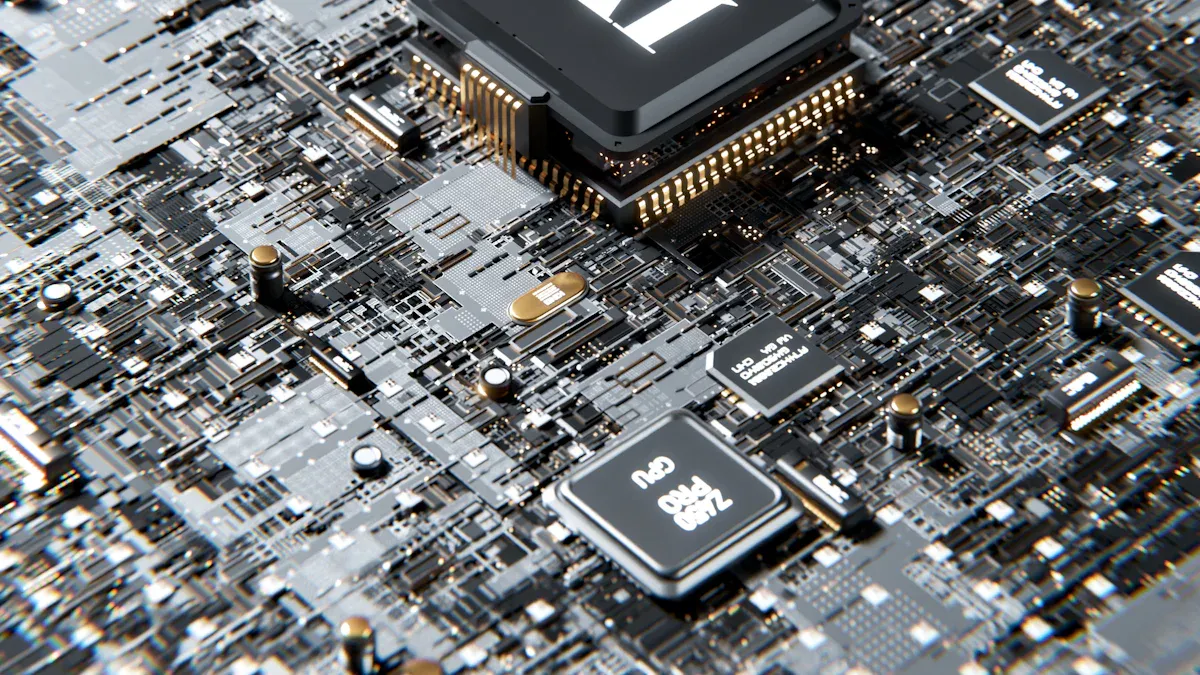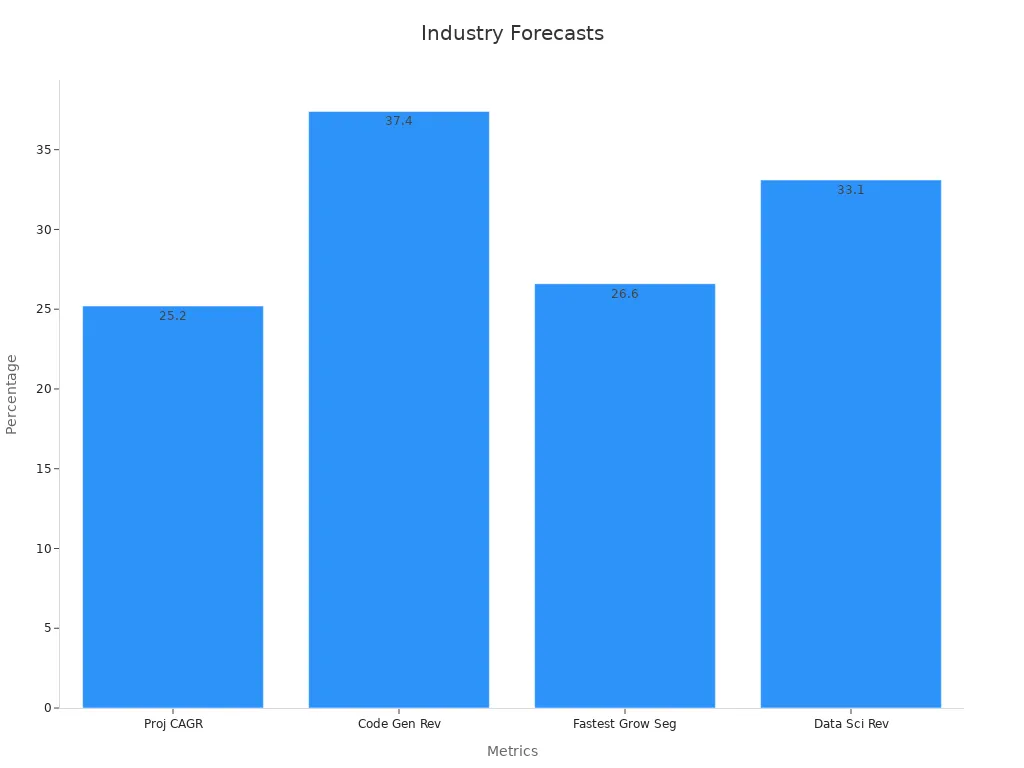Mastering Full Stack AI Code Generators in 2025

Full stack AI code generators are changing how software is made. These tools use artificial intelligence and coding systems to build apps. They can create both the user interface and the backend. Their main benefit is saving time and cutting costs.
A McKinsey report shows their impact: companies using AI tools cut development time by 43% and costs by 37%. Also, 78% of developers use AI tools weekly, and 42% use them daily. These numbers show how popular and helpful AI tools have become.
Learning full stack AI code generators in 2025 is very important. Tools like EZsite AI show this progress. They help you make mobile apps easily and work faster.
Key Takeaways
AI code generators help save time and cut costs. Companies say they work 43% faster and spend 37% less money.
These tools handle boring coding tasks. Developers can focus on creative ideas and solving problems. They make coding simpler for new learners.
Adding APIs and cloud services like AWS or Azure makes these tools stronger. It also helps teams work better together.
Testing and fixing errors are very important for good AI code. Mistakes can happen, so careful checking is needed.
Learning AI tools can boost coding skills and job chances. More jobs in AI are opening up every year.
Understanding Full Stack AI Code Generators
Definition and Purpose
A full stack AI code generator is a tool that uses artificial intelligence to build both the frontend and backend of apps. These tools make coding faster by automating repeated tasks. They let you focus on creative ideas instead of writing the same code over and over.
Researchers have studied how these tools work and their challenges. For example, Zhou et al. (2025) found problems like compatibility issues with tools like GitHub Copilot. Liang et al. (2024) showed that AI tools save time by reducing typing and helping with coding rules. Abrahamsson et al. (2024) explained how AI makes work easier by breaking big tasks into smaller ones. These studies show that full stack AI code generators help you work faster and smarter.
Study | Findings |
|---|---|
Zhou et al. (2025) | Found problems with GitHub Copilot, like compatibility issues. |
Dakhel et al. (2023) | Compared AI-made solutions to human ones, noting AI bugs. |
Barke et al. (2023) | Found developers use Copilot for speed and exploring ideas. |
Liang et al. (2024) | Showed AI tools save time by reducing typing and helping recall. |
Abrahamsson et al. (2024) | Found ChatGPT improves workflows by breaking tasks into smaller steps. |
Key Components
Full stack AI code generators have important parts that make them work well. These parts help developers create apps easily:
AI-Powered Code Suggestions: Tools like Tabnine suggest code as you type. This helps you write faster and avoid mistakes. DevTech used this to save time on projects.
Automated Testing and Debugging: Tools like Testim and Rookout check for errors and fix them. MobileDev used these tools to make better apps faster.
Deployment and Monitoring: Platforms like Dynatrace help launch and track apps. BigSoft used this to improve app performance and reduce downtime.
These features make sure AI tools help with coding and the entire app-making process.
Role in Modern Development
Today, full stack AI code generators are very important in software development. They help you build apps quickly, save money, and improve code quality. By handling boring tasks, these tools let you focus on solving harder problems.
AI tools also make coding easier for beginners. Even if you’re new, these tools guide you, fix mistakes, and suggest better ways to code. This makes it possible for more people to create great apps without needing years of experience.
Businesses also gain from these tools by launching products faster. With AI doing most of the hard work, teams can focus on making features better. This speed helps companies stay ahead in the digital world.
Tech Stack for Full Stack AI Code Generators

AI Models and Frameworks
AI models and frameworks are the main parts of full stack AI code generators. These tools use advanced models like Qwen 2.5 and LG EXAONE 3.0 to handle hard tasks. For example, Qwen 2.5 is great at creating correct code and solving math problems. Developers love it for these reasons. Companies like Xiaomi and Perfect World Games use it for AI helpers and making content. Frameworks like LangChain make it easier to add these models to your projects by managing tasks and data.
Python is the top programming language for AI work. It holds 28.11% in the PYPL Index. Python is simple and has many libraries, making it perfect for AI apps. JavaScript, with 8.57%, is also important, especially for web-based AI tools. These languages make sure your AI code generator is strong and flexible.
Component | Description |
|---|---|
Programming language | Builds code and connects AI applications. |
Model provider | Gives access to main AI models. |
LLM orchestrator | Makes it easy to combine AI parts. |
Vector database | Saves data for quick searches. |
Monitoring tool | Checks how well AI models work. |
Deployment solution | Handles scaling and setup for AI models. |
APIs and Integrations
APIs and integrations let your AI code generator work with other services. These links help your app connect to databases, payment systems, and CRMs. REST and GraphQL APIs allow smooth communication between your AI tool and other platforms. Hosting services like AWS or Azure make deployment and scaling easy.
Adding APIs also improves database speed. AI tools can make queries better and suggest fixes for database designs. Monitoring tools check API usage and adjust settings to keep systems fast. This helps users have a better experience and keeps systems reliable.
Evidence Type | Description |
|---|---|
API Integration | Uses REST, GraphQL, or other methods to connect with services. |
External Tools | Links with payment systems, CRMs, or databases. |
Database Compatibility | Works with tools like MySQL or PostgreSQL. |
Hosting Infrastructure | Supports platforms like AWS or Azure. |
Frontend and Backend Tools
Frontend and backend tools are key for making easy-to-use apps. On the frontend, frameworks like React and Angular help design user-friendly interfaces. These tools let you focus on how the app looks while AI handles boring coding tasks. For example, AI can quickly create working designs, so you can improve them faster.
On the backend, AI-generated code makes API building and logic development easier. This saves time on repetitive tasks and boosts efficiency. AI also improves database performance by finding and fixing slow areas. Companies say AI spots backend issues faster than regular methods, saving time and money.
AI tools help teams focus on design and user experience.
Backend tasks are quicker with AI-made code for APIs and logic.
Databases run better with AI-tuned queries and suggested fixes.

Building and Integrating Full Stack AI Code Generators
Setting Up AI Models
Setting up AI models is the first step for these tools. Start by picking the best AI model for your project. Models like Qwen 2.5 or LG EXAONE 3.0 are popular. They handle hard tasks well and save time. Fine-tuning these models makes them work even better.
Fine-tuning means training the model with project-specific data. This helps the model create more accurate and useful code. The table below shows how fine-tuning improves results:
Metric | Pre-trained Only (PTO) | Fine-tuned on Full Dataset (DSCf) | Fine-tuned on Cleaned Dataset (DSCc) |
|---|---|---|---|
pass@1 | 39% | 51% | 50% |
EM Predictions | 11% | Similar results | Similar results |
CrystalBLEU | Low | Higher than PTO | Higher than PTO |
Fine-tuning on full or cleaned data boosts performance. It helps create better code. Use tools like LangChain to manage tasks and data flow. This ensures your AI model works smoothly with the system.
Frontend and Backend Development
Frontend and backend development are key parts of building these tools. For the frontend, use frameworks like React or Angular. These make it easier to design user-friendly interfaces. AI can help by creating layouts or suggesting design changes.
On the backend, AI-generated code speeds up API and logic creation. This saves time and keeps your app consistent. AI tools also improve database queries, making apps faster. For example, AI can find slow queries and suggest fixes.
To connect the frontend and backend, use APIs like REST or GraphQL. These allow smooth communication between app parts. Hosting platforms like AWS or Azure make deployment easy. They also help your app handle more users as it grows.
Code Review and Debugging
Reviewing and debugging code is important for quality. AI tools create code fast but can make mistakes. You must check the code to fix errors and meet project needs.
Debugging is even more important with AI-made code. A Purdue University study found ChatGPT’s code was wrong 52% of the time. These errors are often tricky to spot, making debugging harder.
A Purdue University study showed ChatGPT’s code was wrong 52% of the time. These mistakes were often hard to find, adding challenges to debugging.
Use tools like Testim or Rookout to find and fix errors quickly. Automated testing also helps keep your code reliable when making updates. Combining careful reviews with smart debugging tools ensures high-quality code. This reduces errors and keeps your app running smoothly.
Deployment Process
Setting up full stack AI code generators needs careful steps. This ensures your app works well and avoids problems. Follow these steps to deploy successfully:
Get Your Environment Ready
Before starting, prepare your environment. Pick a strong hosting service like AWS, Azure, or Google Cloud. These platforms are reliable and can handle growth. Make sure your environment supports tools like Python or JavaScript used in your project.Improve Your Code for Deployment
AI-made code often needs fixes before deployment. Check the code to ensure it works well with your setup. Use tools like Testim to find and solve issues. This step helps your app run smoothly in real-world use.Automate Deployment Tasks
Automating tasks saves time and reduces mistakes. Tools like Jenkins or GitHub Actions can help create a CI/CD pipeline. This pipeline handles building, testing, and deploying your app. Automation makes deployment faster and more reliable.Check and Test After Deployment
Once deployed, monitor your app to ensure it works properly. Use tools like Dynatrace to track performance and spot problems. Automated tests can confirm your app meets user needs. Regular checks keep your app running well and fix issues quickly.
Deployment Success Rates and Insights
A study of 400 developers at Zoominfo shared useful data about deployment. Developers liked AI-made unit tests and basic code. But results varied by programming language. For example:
TypeScript, Java, Python, and JavaScript had ~30% acceptance rates.
The average acceptance rate for AI-made code was 33%.
Developers rated deployment satisfaction at 72%.
Metric | Value |
|---|---|
Average acceptance rate | 33% |
Acceptance rate for lines | 20% |
Developer satisfaction score | 72% |
Acceptance rates for top languages | ~30% for TypeScript, Java, Python, JavaScript |
These numbers show the need to improve AI-made code and adjust deployment for each language.
Tips for Better Deployment
To deploy successfully, follow these tips:
Test Well: Always test your app in a staging area before going live.
Use Version Control: Keep track of code changes to undo mistakes if needed.
Write It Down: Document your steps and settings to help your team repeat or fix the process.
Comparing AI models like GPT-3.5, GPT-4, and Bard shows that good code quality is key. By using smart tools and following these tips, you can make deployment easier and ensure your app works its best.
Optimizing and Scaling AI Code Generators
Making Performance Better
Improving how AI code generators work makes them faster and more reliable. You can do this by using advanced language models trained on large datasets. These models help with tasks like writing, fixing, and completing code. They also learn from past projects to make future coding easier.
AI tools handle boring tasks, saving time for developers.
Better models make fewer mistakes, so debugging is easier.
Learning from old projects helps create higher-quality code.
By focusing on these steps, your AI tools will work smarter and faster. This not only boosts productivity but also cuts down on fixing errors.
Saving Money
AI code generators help save money in big ways. They speed up development and make fewer mistakes, which saves costs. A study shows these improvements:
Metric | Improvement Range |
|---|---|
Faster work and solving issues | |
Fewer mistakes in coding | 38-47% |
Money earned back (3 years) | 287% ROI |
These numbers show how AI tools save money over time. By reducing errors and working faster, teams spend less. Over a few years, the savings grow, making AI tools a smart choice for tight budgets.
Growing for Bigger Teams and Projects
To use AI tools with bigger teams and projects, plan carefully. Make sure your tools work well with team platforms. Use APIs to link AI tools with project management systems for better teamwork.
For growth, use cloud services like AWS or Azure. These handle more work without slowing down. Automating tasks also helps teams keep up with bigger demands.
Train your team to use AI tools well. When everyone knows how to use them, teamwork improves. This makes it easier to handle larger projects and get the most out of AI tools.
Applications and Use Cases

Real-World Examples
Full stack AI code generators are helping industries work faster and save money. They are useful in many fields:
In finance, AI tools help manage investments better and faster.
Hospitals use AI to plan patient visits and improve care.
Online stores see more sales with AI making shopping personal.
A tech company in San Francisco finished projects 30% faster and cut bug-fixing costs by 25% using AI tools. This shows how AI speeds up coding and helps teams meet deadlines. A McKinsey report also says developers finish tasks twice as fast with AI tools.
These examples prove AI tools help businesses grow and stay ahead. Using these tools means faster work and better results.
EZsite AI for Mobile Apps
EZsite AI is a great tool for making mobile apps quickly. It can create an app or website in under a minute, making it super fast. People love how easy it is to use, even without coding skills. Beginners find it simple, which makes work faster and more enjoyable.
Think about having a working app ready in just one minute. EZsite AI makes this happen, so you can spend more time improving features instead of building from scratch. Its easy design helps anyone, even beginners, make professional apps easily.
Using EZsite AI saves time and makes work smoother, making it perfect for developers and businesses.
Benefits for Developers and Businesses
AI code generators bring big benefits to developers and companies. Over 92% of developers now use AI tools, showing how popular they are. These tools help teams work better together, with 81% saying teamwork has improved.
For developers, AI tools are very helpful. They make coding easier, improve skills, and reduce stress. About 57% of developers say AI tools make them better at coding, and 41% feel less stressed.
Companies finish projects faster and spend less money with AI tools. These tools make work easier, so teams can focus on new ideas. Gartner predicts that by 2028, 75% of developers will use AI tools, up from less than 10% in 2023. This shows how important AI is becoming in software development.
By adding AI tools to your work, you can get better results, work well with others, and stay ahead in the market.
Future Trends in AI Code Generation
New Ideas in Generative AI
Generative AI is changing how software is made. By 2030, this market will grow by 25.2% each year. Code generation will make up 37.4% of the money earned. The fastest-growing part, code improvement, will grow by 26.6% yearly. These tools focus on automating boring coding tasks, making software better, and speeding up work.
Feature | Details |
|---|---|
Market Size (2022) | $19.13 million |
Growth Rate (2023-2030) | 25.2% yearly |
Code Generation Share | 37.4% |
Fastest Growing Area | Code improvement with 26.6% yearly growth |
Data Science Share | 33.1% |
Key Changes | AI-made code, task automation, better software quality. |

These changes show how generative AI is making coding faster and better.
How AI Helps Developers
AI is now a big part of making software. Tools like GitHub Copilot help developers finish tasks 55% faster than manual coding. Companies using AI cut costs by 25-40% and launch products 30-50% quicker. This lets developers focus on solving problems while AI handles simple tasks.
Generative AI will grow from $40 billion in 2022 to $1.3 trillion by 2032.
AI tools help developers create 126% more projects each week.
Businesses using AI for security save $3.05 million per data breach.
The Docker AI Trends Report says AI is shifting developers’ work from repetitive tasks to creative ideas. Using AI means faster work and better results.
New Jobs for Developers
AI is creating exciting job opportunities for developers. Between 2018 and 2024, AI-related jobs grew by 21%. From 2020 to 2024, AI job postings increased by 38%. Generative AI roles alone grew by 50% between 2022 and 2024. This shows the need for developers skilled in AI.
Source | Statistic | Years | Details |
|---|---|---|---|
McKinsey's AI Report | 2018-2024 | AI roles grew as companies adopted AI tools. | |
LinkedIn's Work Report | 38% more AI job postings | 2020-2024 | AI jobs became one of the fastest-growing areas. |
N/A | 50% rise in generative AI jobs | 2022-2024 | Demand for generative AI roles increased quickly. |
N/A | New interdisciplinary jobs | N/A | Roles like AI ethics consultants are growing. |
McKinsey Workforce Report | 30% faster product launches | N/A | AI teams help companies innovate faster. |
As AI grows, you can explore jobs like AI ethics consultant, AI trainer, or generative AI software engineer. These roles offer exciting challenges and let you shape the future of coding.
Learning to use full stack AI code generators in 2025 is crucial. These tools make coding easier, faster, and better. A survey found 97% of developers use AI tools. However, only 38% in the US feel supported by their companies. This shows the importance of learning on your own. Also, 73% of developers say AI improves code and customer happiness. Using these tools can simplify tasks, help learn new coding languages, and build better apps. Begin using these tools now to see all they can do.
FAQ
What is a full stack AI code generator?
A full stack AI code generator is a tool that uses AI to build both the frontend and backend of apps. It handles boring coding tasks, so you can save time and focus on creative ideas.
How can beginners use AI code generators effectively?
Start with easy projects. Try beginner-friendly tools like EZsite AI. Follow step-by-step guides and test different features. These tools help you learn coding faster and improve your skills.
Are AI code generators reliable for professional projects?
Yes, but you should always check the code they make. Tools like GitHub Copilot and Tabnine create good code, but mistakes can happen. Combine AI help with careful checking to get great results.
Do AI code generators replace developers?
No, they help developers by doing simple tasks. You still need to guide the tool, check the code, and solve hard problems. AI tools make your work faster but don’t replace your skills.
What are the main benefits of using AI code generators?
AI code generators save time, cut costs, and make better code. They let you focus on new ideas by handling boring tasks. Businesses also launch products faster and stay ahead in the market.
See Also
Emerging AI HTML Code Generators to Watch in 2025
Creating an Adorable AI Tool: A 2025 Guide
Master Website Creation Using AI Technology in 2025

